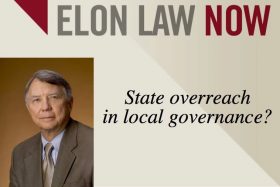In this week’s Elon Law Now commentary, Distinguished Professor of the Judicial Process James G. Exum Jr. says that state legislation to alter the structure of Greensboro’s city council breaks with long-standing public policy and leads to less democratic, less responsive local government.

“Since at least 1975, it has been the public policy of North Carolina, declared by its legislature, to allow cities and towns various options as to how they will be governed. Municipalities can be governed by councils consisting of not less than three nor more than twelve members, elected from single member districts or at-large, for terms of two or four years, with mayors elected by the people or the council, who can vote on all matters or only to break a tie. Municipalities may amend their charters to implement any of these optional forms of government by action of their governing bodies or by referendum. See N.C. General Statutes §§ 160A-101, 102 and 104.
“If Senate Bill 36 is enacted, the City of Greensboro, unlike other municipalities in North Carolina, will no longer have these options. The Greensboro City Council will be required to have seven members (currently nine), elected for four-year terms (currently two-year terms). Other than the mayor, there will be no council members elected at large (currently there are three). The mayor, who will continue to be elected at large, will not have a vote except to break a tie (currently votes on all matters). Neither the city council, by charter amendment, nor the people, by referendum, will be permitted to alter the city’s form of government. If Senate Bill 36 is enacted, the result will be a city government that is less democratic and less responsive to the people than is the current regime. Perhaps that is its purpose.
“Whatever its purpose, Senate Bill 36 is contrary to North Carolina’s long-standing public policy to allow each municipality to choose, within limits, what form of government it will have. The legislation was not sought by and does not have the support of Greensboro’s current council. It seems patently unfair, if not irrational, to deny Greensboro, the state’s third largest city, the options to govern itself that are enjoyed by other North Carolina municipalities. Yet Senate Bill 36 has passed the Senate, passed first reading in the House and has been referred to the House Committee on Elections where it now resides. It is to be hoped that saner heads in that committee or the House at large will have the wisdom to derail and eventually defeat this bill.”
“Elon Law Now” is a weekly series of commentary and analysis by members of the faculty at Elon Law.


